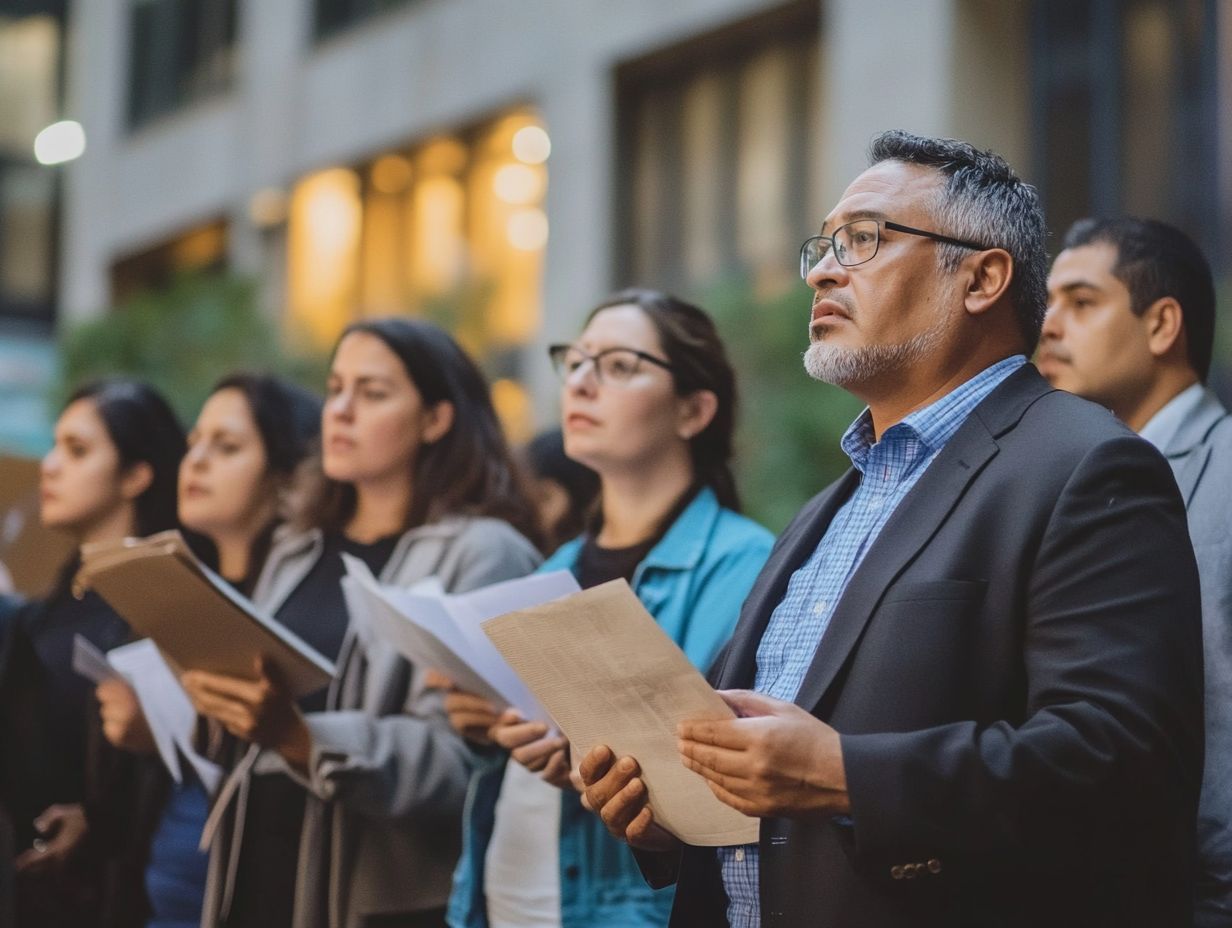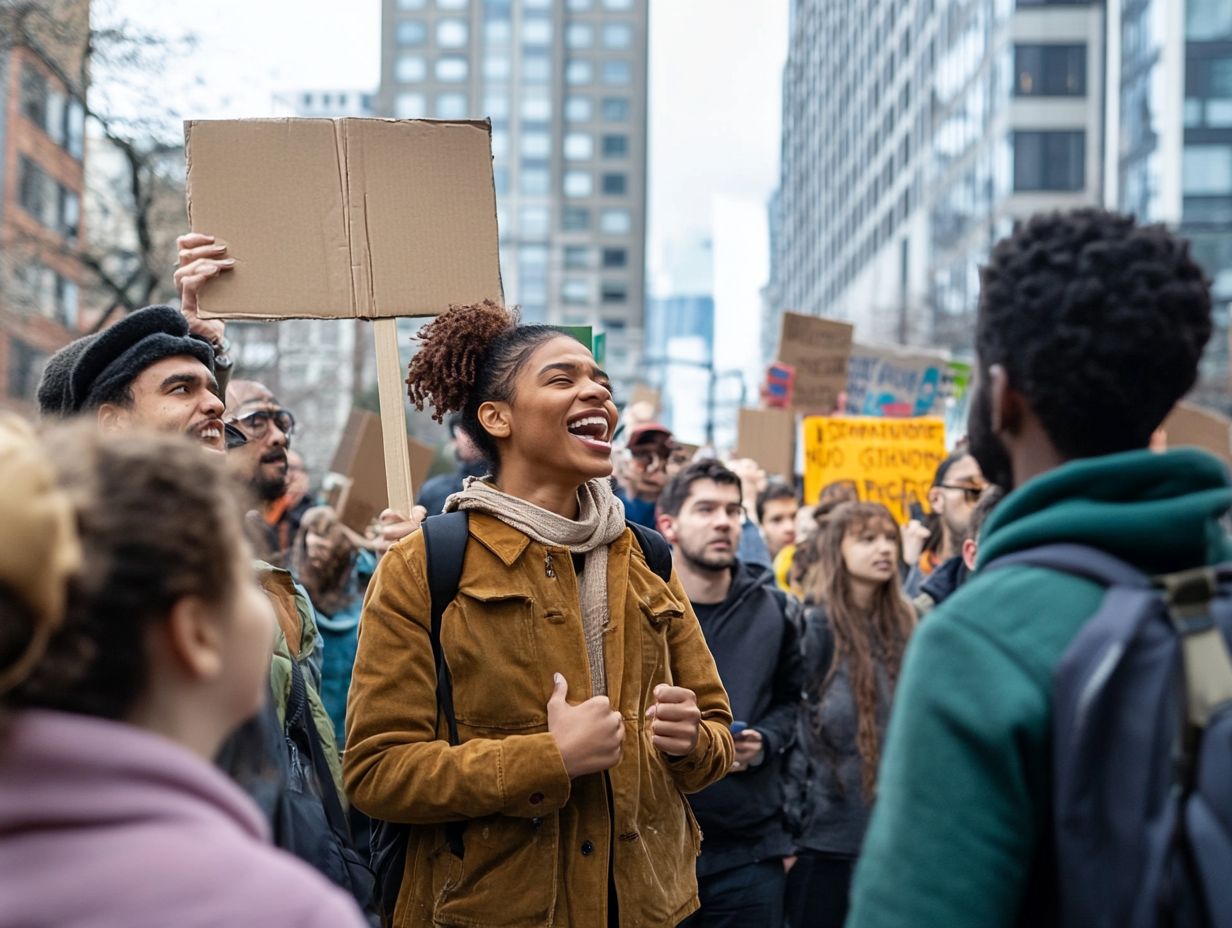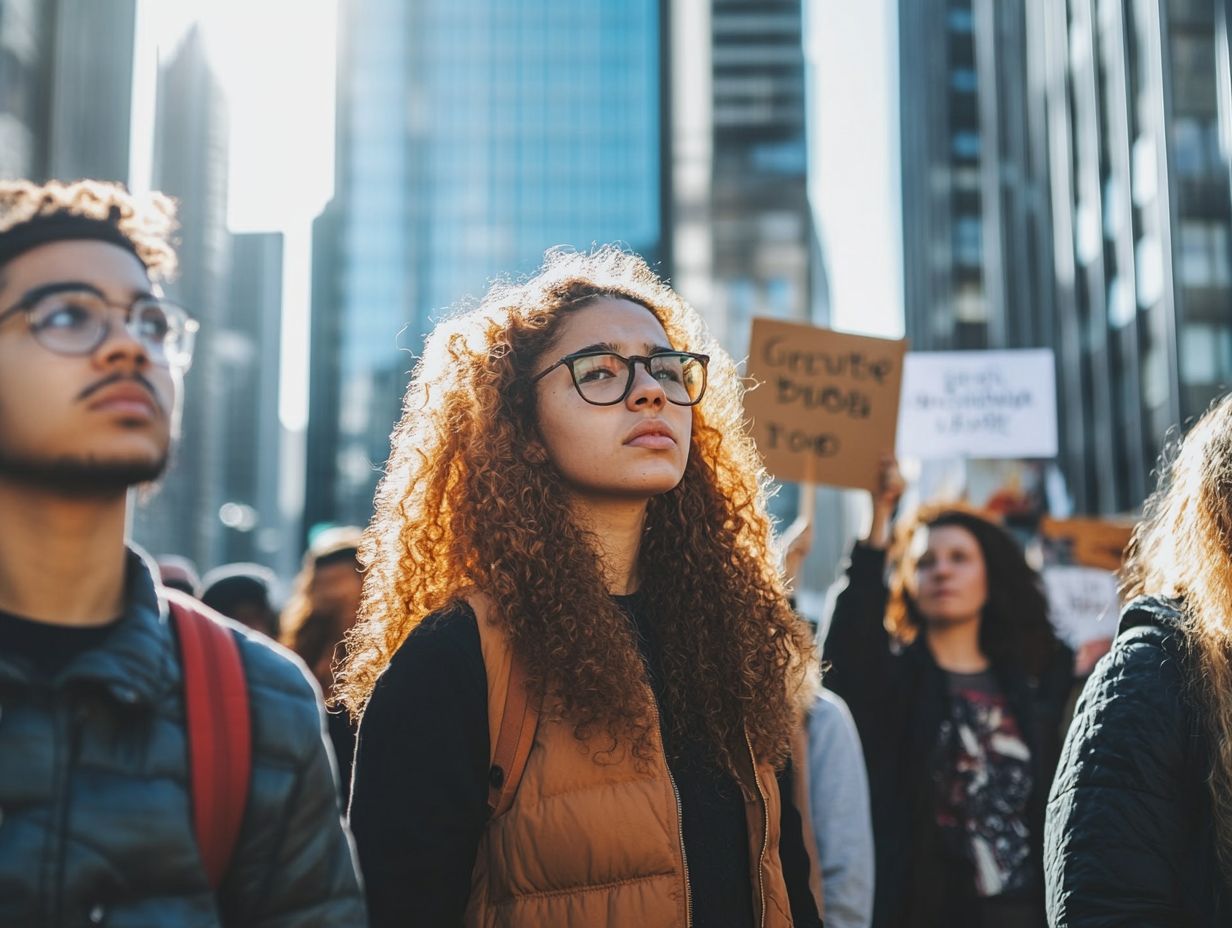Understanding Rights of Non-Citizens
In today s interconnected world, the rights of non-citizens are a vital topic for discussion. From the right to legal steps before punishment to access to education and healthcare, these fundamental rights ensure fair treatment for everyone, regardless of citizenship status.
However, non-citizens face significant challenges when exercising these rights. In this article, you ll explore the basic rights afforded to non-citizens, the legal hurdles they encounter, and the organizations dedicated to advocating for their welfare.
Join in as you unpack this important issue and discover the resources available for those in need.
Contents
- Key Takeaways:
- Definition and Importance
- Basic Rights of Non-Citizens
- Right to Access to Education and Healthcare
- Limitations on Non-Citizen Rights
- Challenges Faced by Non-Citizens in Exercising Their Rights
- Organizations and Resources for Non-Citizen Rights
- Support and Advocacy Groups
- Legal Aid and Services
- Frequently Asked Questions
Key Takeaways:
- Non-citizens have basic rights, including:
- Legal steps before punishment
- Protection from discrimination
- Access to education and healthcare
- Legal restrictions can limit these rights.
- Organizations provide support, such as legal aid and resources.
Definition and Importance
Understanding immigration rights is essential. This knowledge ensures that individuals, particularly undocumented immigrants, are aware of their entitlements when dealing with law enforcement, such as police and ICE (Immigration and Customs Enforcement, the agency that enforces immigration laws).
These rights, established in the U.S. Constitution, include the right to remain silent, the right to legal counsel, and the right to legal steps before punishment. These principles protect family safety and ensure that individuals are not unjustly deported or detained without legal support.
Basic Rights of Non-Citizens
As a non-citizen in the U.S., whether you are an undocumented immigrant or a lawful permanent resident, you are entitled to a range of fundamental rights. These rights protect you from discrimination and guarantee access to essential services, including education and healthcare.
Right to Legal Steps Before Punishment
The right to legal steps before punishment serves as a fundamental protection for individuals, including undocumented immigrants. This ensures that no one faces the loss of their immigration status without a fair hearing and legal representation.
This principle shapes various aspects of immigration law, guiding how cases are handled by entities like law enforcement and ICE. If you face deportation or removal proceedings, the protections of the Fifth Amendment come into play.
You have the right to receive notice of the charges against you, the opportunity to present evidence, and a fair review of your circumstances.
For example, consider the important case of Mathews v. Eldridge, which illustrates how legal steps before punishment work.
Violations of these rights can lead to serious consequences, making it difficult for individuals to challenge unlawful detentions or deportations. This underscores the importance of following legal steps in immigration matters.
Right to Protection from Discrimination
The right to protection from discrimination is crucial for non-citizens. This ensures that you receive equal treatment under the law. This protection allows you to seek legal counsel and pursue your rights without fearing bias based on your immigration status.
This right is especially important given the various forms of discrimination you may encounter, such as workplace bias, difficulties in accessing housing, and unequal treatment in public services.
Organizations like the ACLU are fighting passionately for individuals in these vulnerable situations. They challenge unjust practices and support necessary legal reforms.
The 2019 case of Pereira v. Sessions is an example of the judiciary recognizing non-citizens’ rights against discriminatory immigration practices. Alarmingly, nearly 30% of non-citizens report experiencing discrimination, highlighting the urgent need for strong legal protections to address these injustices.
Right to Access to Education and Healthcare

Non-citizens have the right to access essential services such as education and healthcare. These services are crucial for their well-being and integration into society, even if their immigration status poses some hurdles.
The availability of these services can differ significantly based on state and local regulations. This results in a complex landscape of opportunities and challenges.
Consider programs like:
- SNAP (Supplemental Nutrition Assistance Program) – helps low-income individuals and families buy food.
- TANF (Temporary Assistance for Needy Families) – provides temporary financial assistance to families in need.
- SSI (Supplemental Security Income) – offers financial assistance to individuals with disabilities.
In Texas, for instance, certain non-citizens may face stringent requirements that restrict their eligibility. In contrast, Chicago’s local policies may provide more inclusive pathways for immigrant families seeking assistance.
These disparities highlight the urgent need for advocacy and reform to ensure everyone, regardless of immigration status, can access the support necessary to thrive in their communities.
Limitations on Non-Citizen Rights
While non-citizens have certain rights, notable limitations and legal restrictions can impede their ability to fully exercise these rights. This is particularly true in dealings with ICE (Immigration and Customs Enforcement) and other authorities.
Legal Restrictions and Exceptions
Legal restrictions create a complex landscape for non-citizens, impacting their immigration status and the legal protections available to them. This environment often presents various hurdles related to employment, access to education, and eligibility for public benefits, posing significant challenges for non-citizens.
Many federal financial aid options or certain job opportunities are not available, regardless of qualifications. The enforcement of these laws varies widely; some states impose strict measures that limit access to essential services.
Organizations like the ACLU play a vital role in advocating against these legal barriers. They frequently challenge restrictive policies in court to foster more equitable treatment for everyone, irrespective of citizenship status.
Challenges Faced by Non-Citizens in Exercising Their Rights
Non-citizens often encounter numerous challenges when attempting to exercise their rights. Systemic barriers and enforcement practices complicate their immigration status and hinder access to essential legal protections.
Barriers to Access and Enforcement
Barriers to access create significant obstacles for non-citizens trying to assert their rights, leaving them vulnerable to exploitation and abuse.
Language barriers can further complicate matters, hindering effective communication of needs or understanding of rights in a system that often feels foreign and intimidating.
The constant threat of ICE can create anxiety, making it hard for non-citizens to seek help when they need it most. This intimidation, combined with a lack of public education about available legal resources, often leaves them unaware of the avenues for assistance.
Without comprehensive outreach efforts, non-citizens may find themselves isolated, struggling to navigate the complexities of their situation to secure basic protections.
Organizations and Resources for Non-Citizen Rights

Numerous organizations and resources are available to assist non-citizens in asserting their rights. These entities provide essential legal counsel, advocacy, and vital information, helping non-citizens navigate the complexities of immigration law with greater confidence and clarity.
If you face challenges regarding your rights, don’t hesitate to reach out to local organizations for support!
Support and Advocacy Groups
Support and advocacy groups play an essential role in defending the rights of non-citizens. They offer legal assistance and vital community support.
These organizations work tirelessly to highlight the big challenges faced by immigrant populations. They ensure their voices resonate in policy discussions.
Consider groups like the American Civil Liberties Union (ACLU) and United We Dream. They have spearheaded initiatives that confront unjust immigration practices and advocate for complete changes to the immigration system.
One notable campaign has led to significant changes in local sanctuary city policies. These changes provide protection for non-citizens against deportation and foster safer communities.
By mobilizing grassroots efforts and collaborating with lawmakers, these groups create meaningful dialogue and build support networks. They enable non-citizens as they understand the complicated legal system.
Legal Aid and Services
Access to legal aid is crucial for non-citizens facing immigration issues! This support ensures you have the right representation and guidance.
As you embark on this journey, you may encounter significant challenges. These include language barriers and intricate legal requirements that can feel overwhelming without the right support.
Legal aid comes in various forms think free consultations, attorneys who specialize in immigration law, or nonprofit organizations dedicated to advocating for immigrant rights.
The importance of securing qualified legal counsel cannot be overstated. Experienced attorneys can greatly enhance your chances of achieving favorable outcomes.
Organizations like the ACLU play a vital role in facilitating access to these essential services. They offer resources, referrals, and advocacy to those in need.
You can find legal aid organizations by checking local nonprofits or online directories. Community centers often have valuable connections to legal resources specifically tailored for non-citizens like you.
Frequently Asked Questions
What are the rights of non-citizens?
Non-citizens have the right to be protected by the laws and regulations of the country they are residing in. They also have the right to due process and equal treatment under the law.
Do non-citizens have the right to work in a country?

It depends on the country’s immigration laws and the individual’s visa or work permit status. Some countries allow non-citizens to work, while others have restrictions or requirements for employment.
Can non-citizens own property in a country?
This varies depending on the country’s laws. Some countries allow non-citizens to own property, while others have restrictions or limitations on foreign ownership.
What is the difference between a non-citizen and a citizen?
A citizen is a legal member of a country, while a non-citizen is someone who is not a citizen but is residing in the country. Citizens have more rights and privileges, such as the right to vote and hold public office.
Do non-citizens have access to healthcare and education?
In most countries, non-citizens have the same access to healthcare and education as citizens. However, some countries may have restrictions or limitations for non-citizens, especially for public services.
Can non-citizens be deported from a country?
Yes, non-citizens can be deported from a country if they violate the country’s immigration laws or if their visa or work permit expires. It is important for non-citizens to understand and follow the immigration laws of the country they are residing in to avoid deportation.






